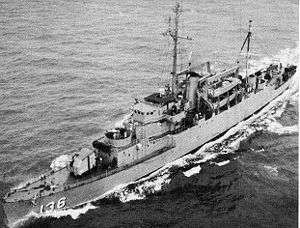USS Carpellotti (APD-136)
 | |
| History | |
|---|---|
| Name: | USS Carpellotti |
| Namesake: | Louis J. Carpellotti |
| Ordered: | 1942 |
| Builder: | Defoe Shipbuilding Company, Bay City, Michigan |
| Laid down: | 31 October 1944 |
| Launched: | 10 March 1945 |
| Commissioned: | 30 July 1945 |
| Decommissioned: | 21 April 1958 |
| Struck: | 1 December 1959 |
| Fate: | Sold for scrap, 1966 |
| General characteristics | |
| Class and type: | Crosley-class high speed transport |
| Displacement: | 1,450 long tons (1,473 t) |
| Length: | 306 ft (93 m) |
| Beam: | 36 ft 10 in (11.23 m) |
| Draft: | 13 ft 6 in (4.11 m) |
| Propulsion: |
|
| Speed: | 23 knots (43 km/h; 26 mph) |
| Range: |
|
| Boats & landing craft carried: | 4 × LCVPs |
| Troops: | 162 troops |
| Complement: | 204 (12 officers, 192 enlisted) |
| Armament: |
|
USS Carpellotti (APD-136) was a Crosley-class high speed transport, the second ship of the United States Navy to be assigned the name Carpellotti, after Marine Private First Class Louis J. Carpellotti (1918–1942), who was posthumously awarded the Silver Star for his actions on Tulagi, Solomon Islands, during the Battle of Guadalcanal.
Carpellotti, originally designated DE-720, a Rudderow-class destroyer escort, was re-designated as APD-136, a fast transport, on 17 July 1944, even before being laid down on 31 October 1944 at the Defoe Shipbuilding Company, in Bay City, Michigan. She was launched on 10 March 1945; sponsored by Mrs. S. Carpellotti. Builders trials before her pre-commissioning cruise were done in Lake Huron.
After completion, Carpellotti sailed from the builder's yard at Bay City to Chicago, Illinois. From there, they went through the Chicago Sanitary and Ship Canal and down the Chicago River to Joliet, Illinois, where pontoons were attached to the ship so it could be pushed down the Des Plaines River, Illinois River, and Mississippi River as part of a barge train. After arriving at the Todd Johnson Shipyard in Algiers, Louisiana, on the west bank of the Mississippi at New Orleans, the rest of the crew reported aboard, and Carpellotti was commissioned at New Orleans on 30 July 1945, with Lieutenant Commander J. V. Brown, USNR, in command.
Service history
As it was completed too late for active participation in World War II, Carpellotti remained on active duty with the Atlantic Fleet, based in Norfolk, Virginia. Following a midshipman's cruise to English and French ports from 24 June through 2 August 1947, she was immobilized with a skeleton crew at Yorktown, Virginia, until 3 February 1948.
Resuming active service, Carpellotti operated from Norfolk on amphibious assault exercises along the United States East Coast and in the Caribbean. In the summer, she made midshipman cruises to European ports, and in 1948 made a good-will tour to the Persian Gulf. She also took part in North Atlantic Treaty Organization exercises: in 1952 in the first NATO amphibious "Operation Mainbrace"; and in 1955 and 1957 during her tours with the 6th Fleet in the Mediterranean.
Carpellotti was placed out of commission in reserve at Norfolk on 21 April 1958, and laid up in the Atlantic Reserve Fleet. Carpellotti was stricken from the Naval Vessel Registry on 1 December 1959. She was sold 20 June 1960, for $141,474 to Diamond Manufacturing Company of Savannah, Georgia, and used in the construction of the Norfolk-Portsmouth, Virginia bridge and tunnel project. In 1966, she was sold by Diamond Manufacturing to Boston Metals Company, Baltimore, Maryland, for scrapping.
Awards
| American Campaign Medal | |
| World War II Victory Medal | |
| National Defense Service Medal |
References
- This article incorporates text from the public domain Dictionary of American Naval Fighting Ships. The entries can be found here and here.
External links
- Photo gallery of USS Carpellotti at NavSource Naval History